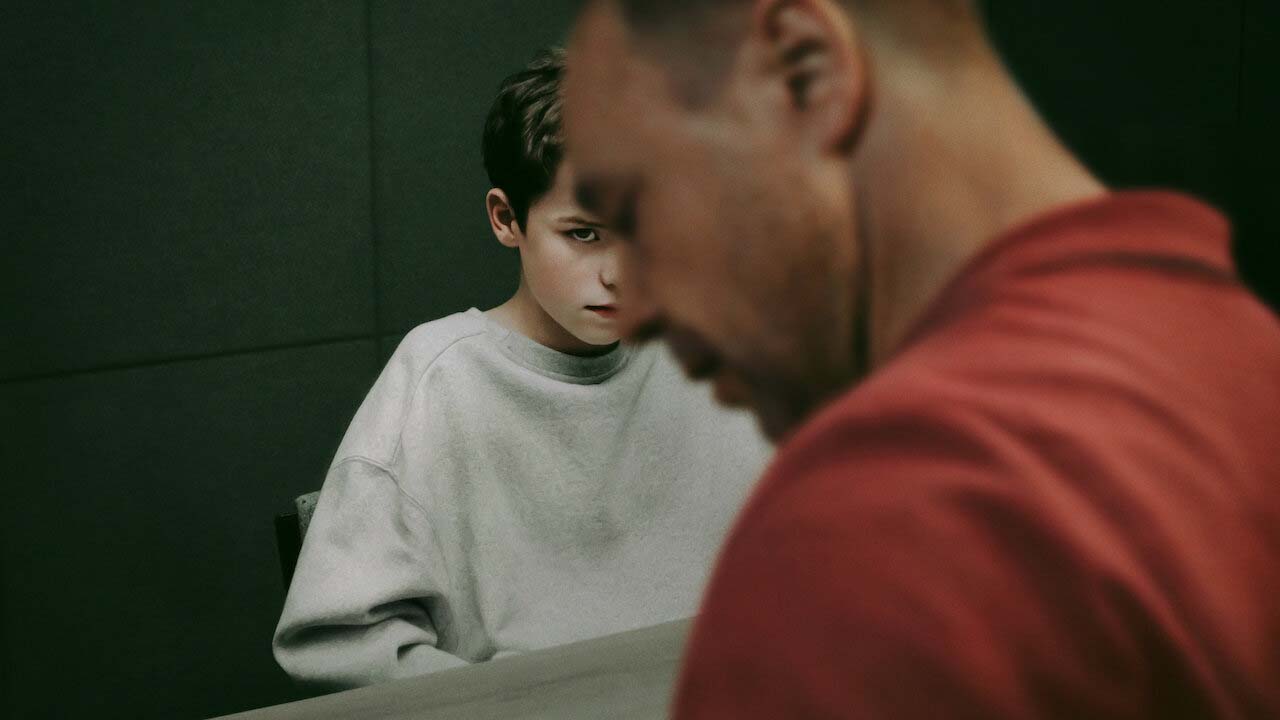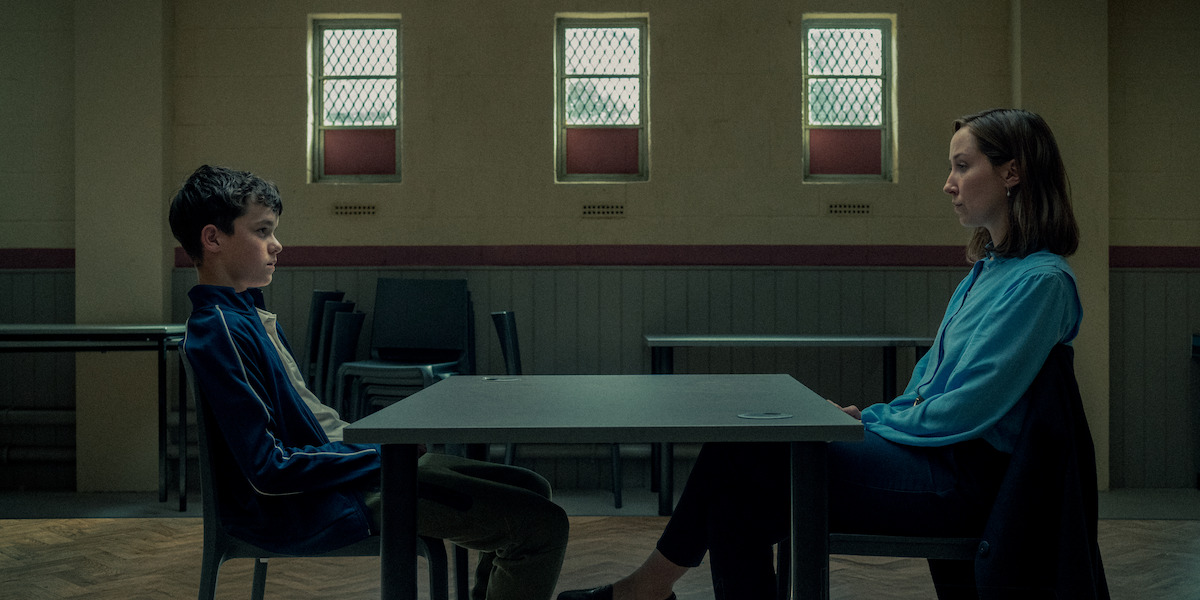- Film And TV
- 21 Apr 25

In its exploration of the manosphere and the toxic effects of social media, Netflix hit Adolescence has had a more profound socio-political impact than any show in living memory. Paul Nolan analyses just why the show has hit such a raw nerve – and looks at the vital conversations it’s likely to inspire.
It says something for how badly the culture was crying out for a show like Netflix’s smash hit, Adolescence, that the series has been met with near universal acclaim. Indeed, since debuting on March 13, the series has had a profound socio-political impact unmatched by any show in recent years.
After seeing a few different references to the series, I first properly became aware of it when – barely 10 days after its release – Tánaiste Simon Harris found himself the target of a characteristically deranged social media outburst by self-styled manosphere “influencer” Andrew Tate.
Sufficiently moved by Adolescence to address it in the Dáil, Harris told the chamber that the series, “really provided a glimpse into how social media influencers are filling a void in young men’s lives… These so-called influencers are feeding young men a warped view of what it is to be a man. And let us be clear, the likes of Andrew Tate and Conor McGregor should not be social media influencers. They should be social pariahs.”
This was enough to prompt the usual stream of poisonous invective from Tate, who posted on X that, “Jealous weak men will do anything it takes to stop powerful men regaining control of the systems. Their objective is to destroy all masculinity”. The bilious rant concluded with Tate labelling the Tánaiste a “scumbag”.
If Harris was impressed by the dramatic power of Adolescence, in the UK, its political impact was no less remarkable. Labour MP Annaliese Midgley called for it to be screened in parliament and in schools, suggesting it would help counter misogyny and violence against women. With the backing of Prime Minister Keir Starmer – who also held a round table meeting with the creators of Adolescence – the show was subsequently made available for free viewing in UK secondary schools.
Advertisement

This is all before we even get to the obligatory avalanche of takes, columns and opinion pieces. And elsewhere, for good measure, Adolescence has been pissing off the right people. Aside from Tate’s scandalised response, the series also earned the ire of Elon Musk – whose head is so increasingly in the clouds, he should probably just board one of his own X voyages into outer space.
The Trump advisor went into full tinfoil hat mode on social media, accusing the series of being “anti-white propaganda”, owing to the casting of a white actor to play the central role of Jamie Miller. Although the claims were self-evidently nonsense, the show’s co-creator, acclaimed playwright Jack Thorne, did generously address them, rightly dismissing them as ridiculous.
UNFLINCHING GAZE
So why the hell has Adolescence caused such a massive kerfuffle? Undoubtedly, not even its co-creators, Thorne and actor Stephen Graham – the latter celebrated for his work in the likes of Boardwalk Empire and Martin Scorsese’s The Irishman – could have foreseen its impact. It also represents a major win for the production companies, including Brad Pitt’s Plan B, as well as Warp Films – an outgrowth of Sheffield electronica label Warp Records, home to the likes of Aphex Twin and Boards Of Canada.
The project has its roots in lockdown, when Graham – fascinated and appalled by a recent spate of teenage knife attacks in the UK – suggested to Thorne a show that would tackle modern adolescence. One of the big reasons for the explosion of interest in the series is that it fearlessly grasps the nettle, and tackles head-on the issue of violence and the young male psyche.
In such a contentious cultural climate, it’s subject matter largely given a wide berth in recent years, but Thorne and Graham rightly recognised that capturing the truth of the moment would require an unflinching gaze. Another key element in the show’s success is that it’s neither didactic nor a polemic – rather, it seeks to understand the unique circumstances that led its protagonist to commit the most unspeakable of crimes.
Advertisement

Stephen Graham in Adolescence
The show focuses on 13-year-old Jamie Miller, played by Owen Cooper in an all-time great debut performance, who’s arrested on suspicion of murdering a classmate, Katie Leonard. Formally innovative, the four-part show is played out in a series of long tracking shots, starting with Jamie’s arrest during a police raid on the family home. Subsequently, we get to understand his relationship with his classmates, as well as the other members of his northern working class family: sister Lisa (Amelie Pease), and parents, Eddie (Graham) and Manda (Christine Tremarco).
Gradually, we piece together the environmental factors that have produced Jamie. He has a close – though highly complicated – relationship with Eddie, who struggles to articulate his emotions and is prone to losing his temper. Making matters even murkier is the atmosphere at Jamie’s school, where the teachers struggle to control the unruly kids. We learn that he has been on the receiving end of online bullying by other students – including Katie – who tease him for being ugly, and taunt him by calling him an incel.
Indeed, in the manner it straightforwardly presents the worst aspects of teen behaviour, Adolescence recalls Larry Clark’s cult classic films Kids and Bully, and makes for similarly discomfiting viewing. One of the most troubling scenes occurs almost as an aside in the second episode, when a boy is violently shoved up against a wall by a classmate, who then insults him and demands money.
It’s the sort of scene that, if played out in the workplace, would result in instant dismissal, and yet, a passing teacher (male, of course) offers nothing more than a perfunctory, “Knock it off lads”. Here, Adolescence hits on an uncomfortable truth, rarely acknowledged: aggression and psychological cruelty are normalised to a worrying level amongst teenage boys.
WARPED OUTLOOK
Advertisement
Still, for all of the possible reasons it suggests for Jamie’s warped outlook and murder of Katie – which he is revealed to have done, via CCTV footage, in a genuinely shocking moment – the shows goes even deeper in its bravura third installment, one of the best TV episodes of the 21st century. It takes the form of a long prison interview of Jamie by a child psychologist, Briony (Erin Doherty).
There are unavoidable echoes of Clarice Starling’s audience with Hannibal Lecter in The Silence Of The Lambs, as Briony arrives for their final meeting, carrying a hot chocolate and Jamie’s favourite sandwich. As she walks in and gets settled, he stands with one hand in his pocket, eyeing her and waiting for their showdown.
In between breaks to compose herself – where she also has to deal with the attentions of a creepy male guard – Briony essentially X-rays Jamie’s psyche, twice pushing him to the verge of attacking her, as she hits on the raw nerves of his wounded self-image and chronic insecurity. There’s a nihilistic ugliness to these scenes that’s almost unbearable, none more so than when Jamie doubles down on his attempted humiliation of Briony, telling it her must be hugely embarrassing to be so afraid of a 13-year-old.
Although she’s far too savvy to take the bait, the sheer nastiness of his character has been laid bare. In an episode that makes inspired use of sound – rainfall is intermittently heard in the background – at one point, as Jamie describes his attack on Katie, his voice fades and the camera zooms in on Briony.
She has arrived at an appalling realisation: his brain rewired by social media and hideous manosphere “influencers”, Jamie appears not to have grasped the seriousness of his situation. “Do you actually understand what death is?” she eventually asks him, aghast.

Owen Cooper and Erin Doherty in Adolescence
Advertisement
But for all the probing at the reasons for his actions, the episode also hints at a more oblique factor woven into the series: that ultimately, there’s some malevolent aspect of Jamie’s psyche that can’t be quantified. In this respect, the episode is as much a study of the nature of evil as anything else.
With Briony the character in Adolescence who’s closest to understanding Jamie, he’s loathe to have the plug pulled on their meetings. When she tells him they can’t meet again, he has to be carried away by a guard, screaming, “Do you like me?”
Briony is left alone, on the verge of tears, struggling to control her breathing and compose herself. She instinctively reaches out to wrap up the sandwich she brought for Jamie, only to quickly recoil in disgust. Like us, she feels almost contaminated by the squalidness of the whole scenario. She eventually gathers up her stuff and leaves – nothing has been resolved, and we are left to reckon with the stark tragedy of a senseless death.
If the final installment of Adolescence doesn’t quite hit such heights, it’s scarcely a criticism. The third episode is simply the crowning moment in a show that – finally – confronts us with the painful truth about the times we live in.
• Adolescence is streaming on Netflix now.










